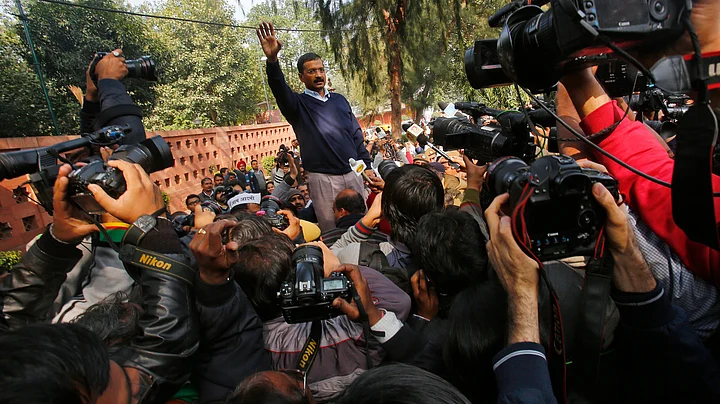You know what I am? I’m a dog chasing cars. I wouldn’t know what to do with one if I caught it!
– Heath Ledger as The Joker, The Dark Knight
A large part of the Aam Aadmi Party’s (AAP) spectacularly successful campaign during the Delhi elections was focused on their 49-day government. It was, understandably, something that needed to be addressed. Why should the people of Delhi vote for a CM who couldn’t work with a cooperative ally?
Kejriwal’s answer was simple and refreshingly straightforward.
1. Our government did good work, which we will continue to do if given a majority.
2. I am sorry for quitting.
Clearly, the people of Delhi forgave him whole-heartedly. AAP won an unprecedented majority in the state legislature when Delhi voted again.
But the last 100 days in power have not been a smooth ride. Politically, AAP has been caught in one storm after another. And unfortunately, the problems stem as much from the fundamental nature of the Party and its ideology, as from circumstances.
Organisation, Ideology, Discipline
AAP’s organisation on the ground is nothing short of extraordinary. With a base of dedicated volunteers, the party has come to power in Delhi and become a political force in Punjab. The inordinate amount of media coverage they have received has also gone a long way in making them a part of the national conversation.
Discipline in the higher echelons of the Party though, remains a crippling problem. Yogendra Yadav and Prashant Bhushan’s departure from AAP was an excruciatingly long and ‘public’ affair. In one of the many ‘stings’ released during the period, Kejriwal himself recognised the complete lack of discipline in his party.
Ye kya tamasha hai aapka ki saare milkar chalo? ….un saalon ne… unhone hame haraane mein koi kasar nahi chhodi Delhi chunaav ke andar… kisi aur party mein hote to unke peeche laat markar bhaga diya hota saalon ko… kameene log hain ek number ke!
–Arvind Kejriwal (as heard in the audio sting)
(What is this farce of all going together? …They left no stone unturned to get us defeated in the Delhi elections… in any other party, they would have been kicked on their rears and booted out ! …These are rascals of the first order!)
Unfortunately for Kejriwal, the mutiny was inevitable. His party seems chronically allergic to structure and organisation, two things which any political movement needs to sustain itself in the long-term.
Charisma can help you lead an agitation, but all political parties need strong institutional mechanisms. Such mechanisms help parties run, set goals, fight elections, connect with supporters, and yes, even deal with dissent. But AAP’s implosion so soon after their victory in Delhi shows that they lack precisely that.
Given that they have no clear ideology, AAP has done the only thing it could do – fall back on the cult of Kejriwal.
In a statement that displays a disturbing anarchist streak, Kejriwal asked party workers and Delhites to ‘sting’ anyone they think is engaging in corruption. This at a time when they had come to power with a huge majority. The implication is obvious – the government has no faith in the administration and institutions that it needs to work with.
This moral arrogance has come back to bite AAP, with Yadav and Bhushan leading the charge. Now AAP has become like every other personality centric political party. Except the others have a history, ideology and usually, some measure of organisational discipline.
Going Along to Get Along
Over the years Arvind Kejriwal has repeatedly derided the political class, calling them corrupt and compromised. His theory of ‘self-rule’, devolving power down to the mohallas, is built on a distrust of the political class.
While constantly attacking India’s politicians, AAP has failed to understand one crucial fact. They have come to power through a legitimate process and represent the will of the people as much as he does.
They also tend to have a much healthier respect for institutions. Sheila Dikshit came to power when the BJP ruled at the centre. There may well have been conflicts even then, but there was none of the drama of the Najeeb Jung-Kejriwal spat.
Gandhi’s Lesson
Our aim in entering politics is not to come to power; we have entered politics to change the current corrupt and self-serving system of politics forever.
– Aam Aadmi Party website
But come to power they did. Why pursue electoral politics if power is not your aim? When the British were finally on their way out Gandhi did not want the Congress to enter electoral politics. He wanted the party to be what the AAP claims to be – a moral force.
Politics is about compromise and managing expectations. It is about institutions and administration. And it is about ideology.
Perhaps Arvind Kejriwal should have followed Gandhi’s advice.
